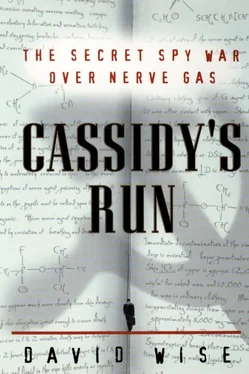The FBI’s statements were a cover story. In fact, Kirkland and Basford at the time of their deaths had been conducting airborne surveillance of a University of Minnesota professor. The professor had been driving north, toward the Canadian border, with his wife and two children. Other FBI agents in cars had been trailing the target on the ground.
The FBI made a calculated decision to mislead the press and the public about the circumstances of the deaths of the two agents. For years, even the agents’ wives and families were told nothing. Until now, the secret has been kept.
The bureau could not afford to divulge the truth, for the crash of the Cessna threatened to unravel the longest-running espionage case of its kind in the history of the cold war, an extraordinary drama that had begun two decades earlier.
The University of Minnesota professor was a Soviet spy, a trained agent of the GRU, the Glavnoye Razvedyvatelnoye Upravlenie, the Soviet military-intelligence agency.
The existence of the case was known only to the president of the United States, his national-security adviser, and a handful of federal officials.
At the highest levels of the United States government, it was codenamed Operation SHOCKER.
On a warmnight in August 1959, Commander Boris M. Polikarpov, who was listed as the assistant naval attaché at the Soviet embassy in Washington, left the YMCA on G Street, two blocks from the White House, after a game of volleyball.
The Y was only a few minutes’ walk from the Soviet embassy on Sixteenth Street, a beaux-arts mansion built by the widow of George M. Pullman, the inventor who designed the railroad sleeping cars that bear his name. [1] 1. Mrs. Pullman never lived in the house. She sold the ornate mansion in 1913 soon after it was completed; a few months later it was sold again, this time to the czarist government. It did not become an embassy until the United States recognized the Soviet Union in 1933.
Polikarpov was a short, tough-looking Slav, with slicked-back straight hair and coarse features. His official position was a cover job. He was in reality a spy, an officer of the GRU. Muscular and physically fit, he had been selected for the YMCA volleyball team that traveled around the Washington area to play other clubs in competition. He had been posted to Washington more than a year earlier.
On this night, Commander Polikarpov noticed an American army sergeant, in uniform, sitting on the steps of the Y and enjoying the summer evening. He was one of the Thursday-night regulars. They had played together in pickup games for several months, sometimes on the same team, sometimes on opposing teams. They did not really know each other, however.
“Hi, have you had dinner yet?” the Russian asked.
The sergeant said he had not. He fell into step with his occasional teammate, and they walked together to a little Italian restaurant nearby.
A big, strapping man of thirty-nine, Sergeant Joseph Edward Cassidy, at six foot one, towered over Polikarpov. Born in Erie, Pennsylvania, Cassidy had spent five years in an orphanage, dropped out of high school, and gotten a job at the local steel plant. He had worked in the intense heat of the open-hearth furnace, turning scrap metal into molten steel. He entered the army in 1943, during World War II, and decided to stay after the war ended. At the moment, he was a first sergeant assigned to the army’s nuclear power field office at Fort Belvoir, Virginia.
At the restaurant, although Polikarpov did not give his name, it was clear to Cassidy that his new friend was a foreigner. His English was imperfect, and he spoke with an accent. Over chicken cacciatore, the two men chatted about volleyball. The Russian asked how long Cassidy had been playing at the Y. Five months, the sergeant replied. There was more small talk, and they parted.
For Polikarpov, a trained intelligence officer, the familiar espionage dance had begun. The casual encounter, a friendly dinner, and the Russian, with luck, might gradually be able to develop the American sergeant into a paid source, a spy for Moscow. Polikarpov had already known how long Cassidy had been playing at the Y. He had watched him since he had first showed up in March and had noticed him in uniform before. Although Cassidy was only a noncommissioned officer, there was no telling what information he might have access to or might be able to obtain in the future. It was entirely possible that the big, amiable sergeant, if handled carefully, might be recruited as an agent in place—a mole inside the United States Army.
The thought was surely exciting to the GRU officer, for a good recruitment might bring a medal; it would certainly be a giant step toward a promotion. His superiors would be pleased.
Above all, this recruitment would be safe. Cassidy was no walk-in, a volunteer spy who had showed up unannounced at the embassy or the consulate, offering his services in return for money. The GRU was well aware that the United States military and the FBI often sent such wouldbe double agents. The Russians were always extremely wary of these bogus volunteers, suspecting, often rightly, that they were really working for American intelligence.
But here the shoe was on the other foot. It was Polikarpov who had spotted Cassidy as a possible developmental. The big sergeant seemed a simple man who enjoyed sports and a good meal. The GRU officer could hardly wait until next Thursday; he would invite the sergeant to dinner again.
The next morning,Cassidy drove alone to a fried-chicken restaurant on U.S. Route 1 and Kings Highway, a few miles north of Fort Belvoir. He met there with two agents of the FBI. He reported the approach by the volleyball player and their dinner together. Those were the words that, for many months, the FBI agents had been hoping they would hear.
Inside the intelligence division of the FBI, the news was electric. Polikarpov had made contact. WALLFLOWER was operational. [2] Cassidy would have preferred a more exciting code name, but he had no choice; WALLFLOWER it was. Most FBI code names for individuals are chosen at random and have no special meaning.
The genial sergeant was, in the jargon of the spy world, a dangle. He had been carefully selected by the bureau and army intelligence and put in the way of Boris Polikarpov. Much like a metal lure flashed to a bluefish in the surf or a delicately tied mayfly presented to a trout in a mountain stream, Joe Cassidy had been sent to play volleyball at the YMCA, where, from its surveillance, the FBI knew that Polikarpov played on Thursday evenings. Now, after five months, Polikarpov had taken the bait.
The following Thursday, Cassidy lounged on the steps outside the Y again. Years later, he remembered those first contacts with clarity. “I always made a point to get out front of the Y ahead of him,” he said, “so he’d see me in uniform when he came out.” On this second Thursday, Polikarpov greeted Cassidy and asked if he had a car.
Cassidy’s blue Buick was parked nearby, and he offered his friend a ride.“We went in my car to a different restaurant,”Cassidy recalled. Dinners with Polikarpov soon became a regular Thursday-night event. “A number of times we went to the Old English Raw Bar along the Potomac. He liked oysters on the half shell.” During their second dinner together, Polikarpov introduced himself simply as“Mike.”He didnot reveal that he was a Russian or that he worked at the embassy.Cassidy didnot press him.
In the course of their early conversations, Polikarpov asked Cassidy casually whether he was married, where he lived, how long he had been in the army, and where he was assigned. At the time, Cassidy and his wife lived in Alexandria, not far from his job at Fort Belvoir. Cassidy explained that he worked in the nuclear power area; his job was to help train operators for the army’s nuclear power plants at Belvoir, Idaho Falls, and in Alaska. [3] Although the public was generally unaware of it, the army in those years operated its own nuclear power plants, including a plant at Fort Belvoir, used for research and training as well as to generate electricity. The Army Corps of Engineers built the plants in the early 1950s, mostly to provide power to military bases in remote areas. In addition to the plants at Belvoir, Idaho Falls, and Fort Greeley, Alaska, the army also ran a nuclear plant for the air force in Sundance, Wyoming, and one in Greenland, nine hundred miles from the North Pole. By 1973, the army was out of the nuclear power business, and the plants had been shut down.
Читать дальше












